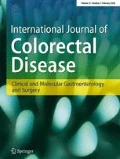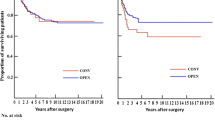Abstract
Introduction
The negative influence of conversion from laparoscopic to open colorectal resection on early postoperative morbidity and outcome has been demonstrated several times. In this study, we analyzed the conversion rate and its influence on early postoperative morbidity and short-term oncological outcome following laparoscopic rectal resections.
Methods
From January 1998 to December 2006, 300 patients underwent laparoscopic resection due to rectal carcinoma at our institution. We compared the converted patient group with the non-converted patient group regarding demographical, clinical, surgical, and histological data, compounded with the early and late postoperative results.
Results
Two hundred seventy-four (91.3%) patients underwent laparoscopic rectal resection (LR), while conversion resection (CR) was necessary in 26 cases (8.6%). Conversion rate was 13% during the first 100 resections and decreased to 3% during the last 100 procedures (p = 0.035). Male gender, higher body mass index, and presence of T4-tumor were risk factors for conversion. Early postoperative complications were more frequent in the CR group than in the LR group. Concerning local tumor recurrence and overall survival, there was no significant difference between both groups (local recurrence, CR at 3.8% vs. LR at 4.5% and overall survival rate, CR at 76.9% vs. LR at 89.1%) after a median follow-up period of 22.5 months.
Conclusion
Conversion to an open procedure during laparoscopic rectal resection correlates with an increased postoperative morbidity, however, without impairment of the short-term oncological outcome. The conversion rate is minimized by the growing experience of the operating surgeon and, therefore, is a marker of the learning curve.



Similar content being viewed by others
References
Aziz O, Constantinides V, Tekkis P et al (2006) Laparoscopic versus open surgery for rectal cancer: a meta-analysis. Ann Surg Oncol 13:413–424
Bärlehner E, Benhidjeb T, Anders S, Schicke B (2005) Aktueller Stand der laparoskopischen Rektumresektion beim Karzinom. Chir Gastroenterol 21:54–61
Bennet CL, Stryker SJ, Rosario Ferreira M, Adams J, Beart RW (1997) The learning curve for laparoscopic colorectal surgery. Arch Surg 132:41–44
Bretagnol F, Rullier E, Couderc P, Rullier A, Saric J (2003) Technical and oncological feasibility of laparoscopic total mesorectal excision with pouch coloanal anastomosis for rectal cancer. Colorectal Dis 5:451–453
Casillas S, Delaney C, Senagore A, Brady K, Fazio V (2004) Does conversion of laparoscopic colectomy adversely affect patient outcome. Dis Colon Rectum 47:1680–1685
Gervaz P, Pikarsky A, Utech M, Secic M, Efron J, Belin B, Jain A, Wexner S (2001) Converted laparoscopic colorectal surgery: a meta-analysis. Surg Endosc 15:827–832
Guillou PJ, Quirke P, Thorpe H et al (2005) Short term endpoints of conventional versus laparoscopic assisted surgery in patients with colorectal cancer (MRC CLASSIC trail): multicentre, randomized controlled trail. Lancet 365:1718–1726
Hartley JE, Mehigan BJ, Qureshi AE, Duthie GS, Lee PWR, Monson JT (2001) Total mesorectal excision: assessment of the laparoscopic approach. Dis Colon Rectum 44:315–321
Köckerling F, Reymond MA, Schneider C, Wittekind CH, Scheidbach H, Konradt J, Köhler L, Bärlehner E, Kuthe A, Bruch H-P, Hohenberger W (1998) Prospective multicenter study of the quality of oncologic resections in patients undergoing laparoscopic colorectal surgery for cancer. Dis Colon Rectum 41:963–970
Lacy AM, Garcia-Valdecasa JC, Delgado S, Castells A, Taura P, Pique JM, Visa J (2002) Laparoscopy-assisted colectomy versus open colectomy for treatment of non-metastatic colon cancer: a randomised trial. Lancet 359:2224–2229
Larach SW, Patankar SK, Ferrara A et al (1997) Complications of laparoscopic colorectal surgery: analysis and comparison of early vs. later experience. Dis Colon Rectum 40:592–596
Leroy J, Jamali F, Forbes L, Smith M, Rubino F, Mutter D, Marescaux J (2003) Laparoscopic total mesorectal excision (TME) for rectal cancer surgery: long-term outcomes. Surg Endosc 2:281–289
Leung KI, Kwok SPY, Lee JFY, Yiu RYC, Ng SSM, Lai PBS (2004) Laparoscopic resection of rectosigmoid carcinoma: Prospective randomised trial. Lancet 363:1187–1192
Marusch F, Gastinger I, Schneider C et al (2001) Importance of conversion for results obtained with laparoscopic colorectal surgery. Dis Colon Rectum 44:207–214
Marusch F, Gastinger I, Schneider C et al (2001) Experience as a factor influencing the indications for laparoscopic colorectal surgery and the results. Surg Endosc 15:116–120
Moloo H, Mamazza J, Poulin EC, Burpee S, Bendavid Y, Klein L, Gregoire R, Schlachta CM (2004) Laparoscopic resections for colorectal cancer. Does conversion affect survival. Surg Endosc 18:732–735
Morino M, Parini U, Giraudo G, Salval M, Brachet Contul R, Garrone C (2003) Laparoscopic total mesorectal excision. A consecutive series of 100 patients. Ann Surg 237:335–342
Pikarsky AJ, Saida Y, Yamaguchi T et al (2002) Is obesity a high-risk-factor for laparoscopic colorectal surgery. Surg Endosc 16:855–858
Ptok H, Steinert N, Meyer F, Kröll KP, Scheele C, Köckerling F, Gastinger I, Lippert H (2006) Operative Behandlung von Rektumkarzinomen im Vergleich, onkologische Langzeitergebnisse einer multizentrischen Beobachtungsstudie nach laparoskopisch-assistierter, konvertierter und primär offener Operation. Chirurg 77:709–717
Schlachta CM, Mamazza J, Seshadri PA, Cadeddu MC, Gregoire R, Poulin EC (2001) Defining a learning curve for laparoscopic colorectal resections. Dis Colon Rectum 44:217–222
Schwandner O, Schiedeck T, Bruch H-P (1999) The role of conversion in laparoscopic colorectal surgery. Do predictive factors exist. Surg Endosc 13:151–156
Slim K, Pezet D, Riff Y, Clark E, Chipponi J (1995) High morbidity rate after converted laparoscopic colorectal surgery. Br J Surg 82:1406–1408
Tekkis P, Senagore A, Delaney C, Fazio V (2005) Evaluation of the learning curve in laparoscopic colorectal surgery. Comparison of right-sided and left-sided resections. Annals of Surg 242(1):83–91
The Clinical Outcomes of Surgical Therapy Study Group (2004) A comparison of laparoscopically assisted and open colectomy for colon cancer. N Engl J Med 350:2050–2059
The colon cancer laparoscopic or open resection study group (2005) Laparoscopic surgery versus open surgery for colon cancer: short-term outcomes of a randomized trail. Lancet Oncol DOI 10.1016/S1470-2045(05)70-221-7
Wittekind C, Meyer HJ, Bootz F (2003) UICC: TNM Klassifikation maligner Tumoren, 6th edn. Springer, Berlin Heidelberg, pp 66–70
Yong L, Deane M, Monson JR et al (2001) Systematic review of laparoscopic surgery for colorectal malignancy. Surg Endosc 15:1431–1439
Author information
Authors and Affiliations
Corresponding author
Additional information
Authors A. Agha and A. Fürst contributed equally
Rights and permissions
About this article
Cite this article
Agha, A., Fürst, A., Iesalnieks, I. et al. Conversion rate in 300 laparoscopic rectal resections and its influence on morbidity and oncological outcome. Int J Colorectal Dis 23, 409–417 (2008). https://doi.org/10.1007/s00384-007-0425-5
Accepted:
Published:
Issue Date:
DOI: https://doi.org/10.1007/s00384-007-0425-5




